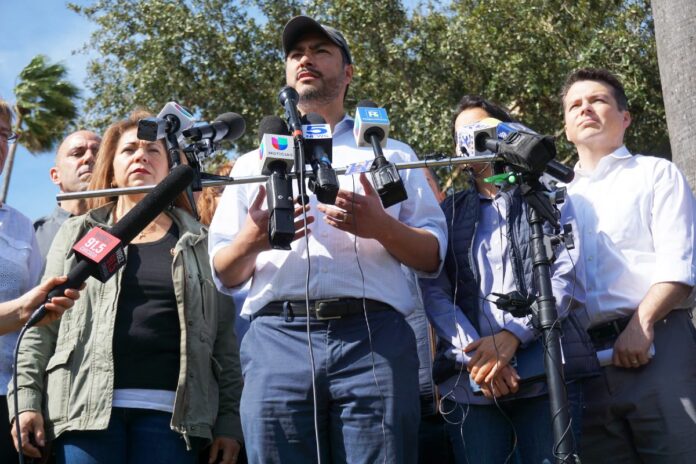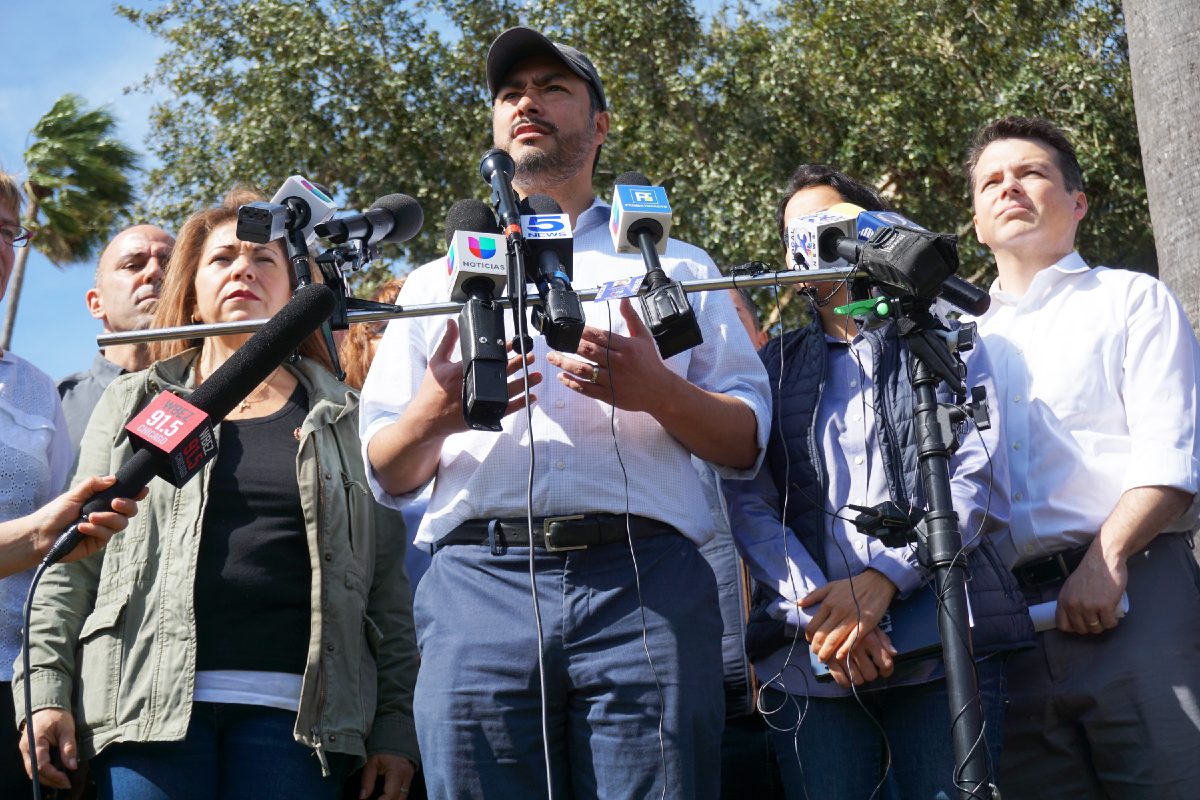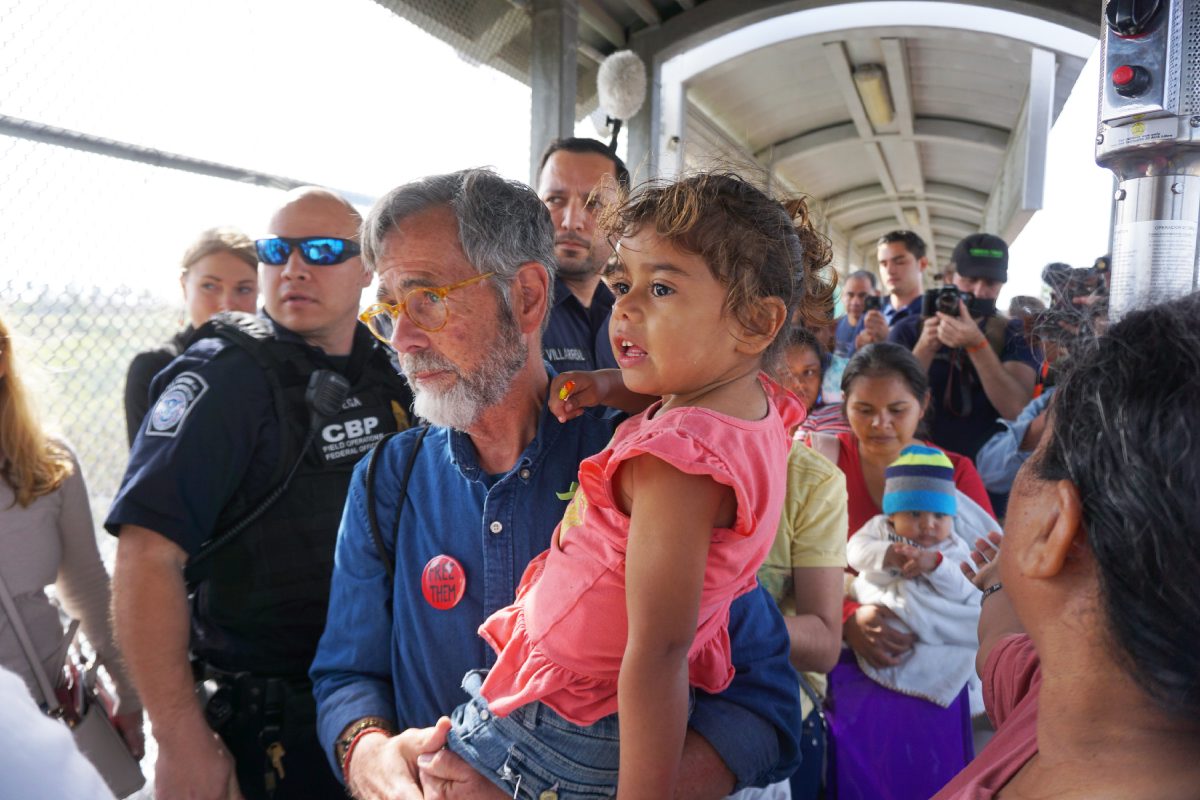
A delegation of congressional leaders followed U.S. Rep. Filemon Vela, D-Brownsville, into Matamoros to witness conditions in the camp of asylum seekers just past the Gateway International Bridge on Friday.
The coalition, consisting of various members of the Congressional Hispanic Caucus, saw a version of the camp filled with Mexican military and federal police standing by, armed with rifles. The staircase leading up to a levee along the Rio Grande had been cleared of caked, dried mud.
“Are these armed police usually here?” asked U.S. Rep. Rosa DeLauro, D-CT, before confirming that authorities were present in the camp on Friday as a direct result of the delegation.
A woman said that she had been paid to clean the bathrooms set up by Mexico’s Nacional de Protección Civil (SINAPROC). The facilities were constructed in December on a recreational soccer field after a meeting in Washington, D.C., between Vela, local organizers, and Mexican officials, according to the congressman.
Sister Norma Pimentel, who runs the Humanitarian Respite Center in McAllen, made note that “one thing you have to take into consideration is that the river is right here. When the weather is bad, this floods immediately. When hurricane season hits here, that river will be up to where we’re standing.”
Four families of asylum seekers waited on the bridge with attorney Charlene D’Cruz while the delegation toured the camp in Matamoros. A volunteer with Witness at the Border desperately tried to get congressional members to break from the tour in order to plead with U.S. Customs and Border Protection officials on the bridge.
An hour later, lawmakers, aides, and press formed a bottleneck at the international line as several members of the delegation began to ask the officers questions.
Representatives Marcy Kaptur, D-Ohio and Ben Luján, D-New Mexico asked CBP officers whether they could provide the name of the supervisor responsible for determining whether CBP would cross the families. Kaptur offered to accompany the families.
“We’re not able to do that,” said one of the two officers before reminding the four families to remain on the Mexican side of the international line.
Tomas Cartwright, a global refugee advocate and Witness at the Border organizer who accompanied a group of volunteers to assist D’Cruz cross families three days in a row, argued with the officers. They warned him not to “block the entrance to the country.”
“We’ve been waiting 40, 50 minutes for a supervisor,” he said. “He’s hiding in that room down there because he doesn’t even want to come down here and talk to the head of the Hispanic Caucus, much less give a damn about two mothers here with three babies who have every legal right to be in this country.”
The families were from El Salvador and Honduras and had Mexican-born infants, as well as toddlers with emergent medical conditions. These factors should exempt them from the Migrant Protection Protocols (MPP), according to D’Cruz.
“There was a family of three. The mother is from El Salvador and her daughter has Down Syndrome and a heart condition,” said D’Cruz. She said that the three Honduran mothers each had a Mexican-born infant.
“It’s immoral. You can’t just send the children across, so we’re making the case that families need to be granted parole,” she said. MPP does not apply to Mexican citizens.
D’Cruz and advocates presented the families at the bridge four times prior. Friday was the fifth day in a row.
The group waited an hour for a supervisor to show up. Port Director Tater Ortiz, who D’Cruz said she hasn’t been able to contact in recent weeks, showed up no less than three minutes after U.S. Rep. Joaquin Castro, D-San Antonio, began pressuring officials.
D’Cruz later confirmed that the Salvadoran family had been paroled to family sponsors in the United States. As of press time, she was still waiting to hear from the three other families, who were taken into the checkpoint for processing. “I don’t trust CBP, so we’ll see what happens” she said.
The delegation made its way into the tent courts at the port of entry in Brownsville. The press was only recently allowed to access the system following months of allegations that immigration judges have not been ensuring due process and was barred from entering with members of Congress.
Michael Benavides of Team Brownsville said that he spoke with a man who had his hearing on Thursday. “He said that he was asked which country he wanted to be deported to,” he explained, confirming that recent agreements between the United States, Guatemala, and El Salvador will likely see families deported back to dangerous conditions in Central America.
“It’s important to know that there’s a common denominator among these people,” he told the delegation in Matamoros. “They are good. Every person that is here — every family, every child — has a sponsor in the United States; someone that loves them, someone that is waiting for them.”
Benavides noted that families do not feel safe in the camp and that the massive tents set up by the Mexican federal government — which are fenced in and provide protection from the rain — are intended to provide some sort of security from cartels and gang members.
“We have a lady with three children — 13-year-old girl, 10-year-old-girl, and an 8-year-old son. At night, she puts them in the tent and zips them up. She sleeps outside of the tent on the zipper so that no one enters her tent,” he told representatives.
Members of the delegation also spoke with Helen Perry, executive director of Global Response Management. The organization is currently the only medical NGO set up full-time along the U.S.-Mexico Border and is tracking conditions without any government assistance.
Perry told lawmakers that her organization needs access to government funding. Earlier this month, she explained that both the United Nations and the responsible governments would normally be funding humanitarian efforts. None of that is happening in Matamoros, where aid is provided via donations through local citizen networks.
“CBP says they’re not sending sick children and families back to the camp,” she told the delegation. “I would tell them that I’m handling roughly 1,000 patients per month.”
Back across the border, representatives held a press conference in Xeriscape Park.
“There are folks there who obviously don’t have running water. There are young kids less than a year old who are living with their parents in squalor. These are conditions that people seeking asylum and refuge in the United States should not have to endure,” Castro told the crowd.
Rep. Debbie Wasserman Schultz, D-FL, called the conditions in Matamoros “heinous human rights abuses.” Another representative, Suzanne Bonamici, D-Oregon, told reporters that she spoke to a woman from El Salvador whose sick baby was lying on the floor of a tent.
“This is no way to treat families who are coming to the U.S. because they are seeking a better life. They are escaping violence. They are escaping countries where they are not safe. Please, everyone, speak up,” she said.
According to Castro, the delegation will be taking their findings back to the House Judiciary Committee, which recently opened an investigation into the Trump administration’s “Remain in Mexico” policy.
“As far as I can tell, the Mexican government is also complicit in these human rights abuses because they’re doing absolutely nothing to help these folks at all,” he told reporters.
Vela took a moment to speak with The Herald while crossing back into the United States, pointing out that a news cycle saturated with things like the assassination of Qasem Soleimani and President Donald Trump’s impeachment trial is also diverting attention from the crisis at hand.
“Our asylum laws say that these people have the right to be in the United States while their claims are adjudicated. Most of these people have family sponsors,” he said.






